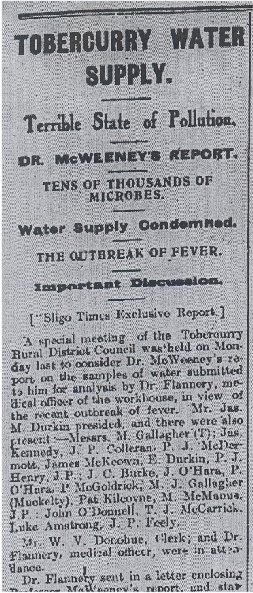Tobercurry Waterworks - Sligo Poets
Main menu:
- Home
-
1912
- 1912
- Sligo Poetry 1912
-
1913
- 1913
- Sligo Poetry 1913
-
1914
- 1914
- Sligo Poetry 1914
-
1915
- 1915
-
Sligo Poetry 1915
- Sligo Newspaper Poems
- Sligo Champion
- Sligo Independent
- Sligo Nationalist
-
1916
- 1916
-
Sligo Poetry 1916
- Sligo Newspaper Poems 1916
- Sligo Champion
- Sligo Nationalist
- Sligo Independent
- The Poets
- Bibliography
- The Author

Sligo Times 29 June 1912
Tobercurry Waterworks.
Although we built at some expense, the fountains and the tank,
Death’s messengers in millions, were in every drop we drank;
The doctor, up and doing, now has sounded the alarm,
And water pure we must procure outside the Workhouse farm;
I’m confident the Council from its duty will not shrink
With water, water, everywhere, not any drop to drink.
The people call for water that will stands McWeeney’s test,
And some would bring it from the east and others from the west;
Small blame it is to any men to bring a silvery rill
By any means to work their own and not their neighbours’ mill;
They anxiously discuss the loan, and hum while glasses clink,
“There’s water, water everywhere, but none of it we’ll drink.”
Old Biddy told a neighbour when discussing the disease,
Its cause and cure—the horganses(a) were killed but by degrees;
They were—the schoolmaster explained to her when last they had a chat—
When boiled two hundred times and twelve, knocked out o' use(b) at that;
And then he added—queerly—that ’twas prosperous(c) to think
We had water, water, everywhere and not a drop to drink.
Notes:—(a) Organisms, very likely; (b) innocuous perhaps; (c) preposterous, probably. The sanitary authorities had given notice, that water for drinking should be boiled. It is evident. that Biddy did not follow the schoolmaster’s explanation with due attention.
You see that weary wayfarer come hobbling down the street,
He cannot go much further until he rests his blistered feet;
He longs, or I’m mistaken, to grasp a pewter pot,
But faces tow’rds the fountain, for the day is burning hot;
And there what warning greets him, “as he gasps upon the bunk?”
Water, water, everywhere, but not a drop to drink!
By Order of the Council in the Courthouse th' other day,
The sanitary officers appeared in grand array;
With big books arranged around them, and with papers spread before,
Prosecuting Tommy Dodd for a Plodhaun at his door;
When costs were given against him how their spirits seemed to sink—
Oh! water, water everywhere, though not a drop to drink.
Now schoolboys in the new-
The "National" board has ordered they must all be taught to swim;
There tired and grimy workers may on Sunday have a wet,
If one more to their living, front or rear, they cannot get:
’Tis among the workers we should seek the missing link
When water, water’s, everywhere, and not a drop to drink.
When we chanced to have some time ago, a week or two of drouth,
And the scarcity of water was in everybody’s mouth;
A reservoir the Council built, and money did not spare
On ornamental fountains so convenient in the square,
But now the Carrowtuber boys can shake their heads and wink,
When water, water’s everywhere, and not a drop to drink.
Our energetic councillors, I’m sure will do their best
To bring the township water that will stand the highest test;
Whatever source, whatever course, it is my wish that all
May share the benefits alike, the big house and the small;
Until then dear neighbours, that old barebones we may blink,
And that when the works are finished we may all be there to drink.
—Jim Gouldrick
Tobercurry, St. John’s Eve, 1912.
During 1912 their was a serious outbreak of fever in the Tubbercurry area and a number of deaths resulted. This led to extensive investigation of the town's water supply and plans to provide a new source of water.
These plans caused much debate and disagreement at Tubbercurry District Council and Board of Guardians meeting and between the Tubbercurry Boards and the Local Government Board. The Sligo Times, and other Sligo newspapers carried extensive reports in its issue of of 22 June 1912 including the results of analysis of Tubbercurry's water by Professor Edmond Joseph McWeeney of the Bacteriological Laboratory, Dublin. (See report below)
This poem, published in the following week's issue is a clever, well-
The controversy fed into the Unionist argument that since local government under nationalist control was inefficient Home Rule would likewise not function very well. This may have been a factor in this poem's publication by the Sligo Times.
The author makes fun of an old woman's misunderstanding of the teacher's explanation of the problem and to make sure the reader understands, provides explanatory notes.
For more on the author see the page on The Girl of Glenavoo.
